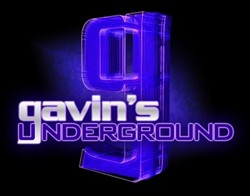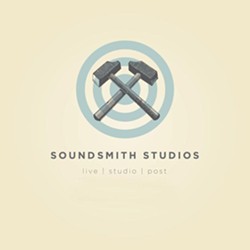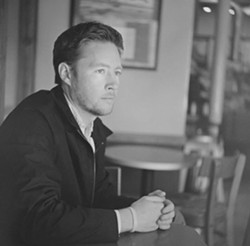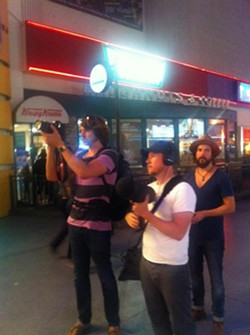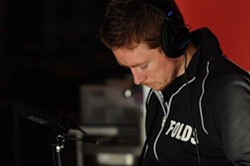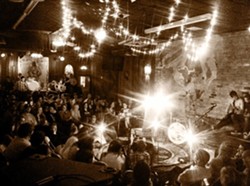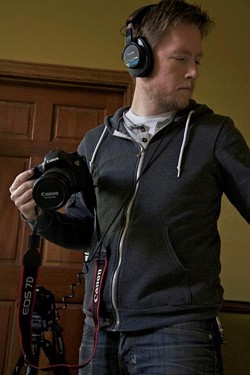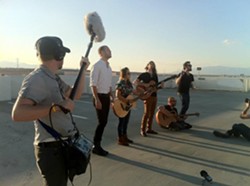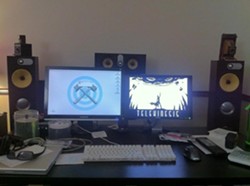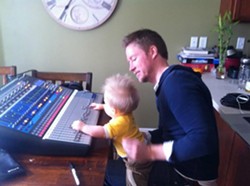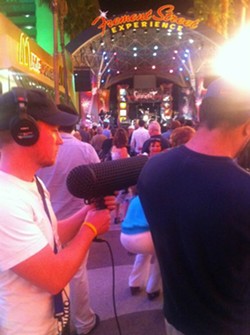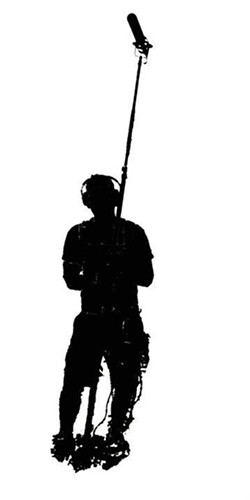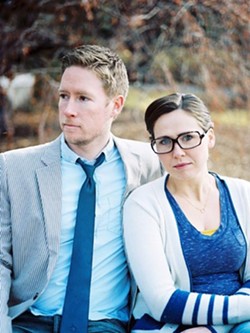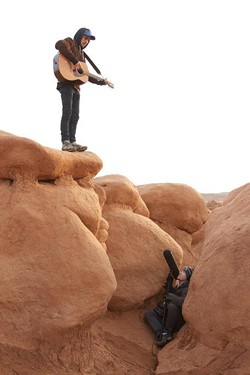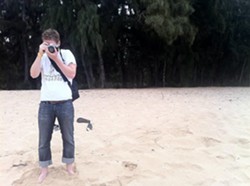Sunday, June 10, 2012
SoundSmith Studios
Posted By Gavin Sheehan on June 10, 2012, 9:00 AM
While music may be the main characteristic of the Provo entertainment scene, film and audio in general have started seeing a boom throughout the college and underground scene. --- About half a dozen film crews have popped up in the past year, documenting and filming the scene around them or creating their own original works to make online series for people to check out. Much like SLC and Ogden, many of these miniature production groups are self-contained and work on their own material, but there are a few who have branched out and turned their passion into a business.
Take, for example, SoundSmith Studios -- a multimedia creative studio in the heart of downtown Provo, providing musicians and filmmakers a source for quality production, while creating their own material and resources such as The Music Lounge. Today, we chat with the namesake founder, Daren Smith, about his career in film and audio, as well as his current projects, the studio and the company itself, thoughts on the local music scene and a few other topics.
Daren Smith
Gavin: Hey, Daren. First thing, tell us a bit about yourself.
Daren: Thanks for the opportunity to be on the site, Gavin. My go-to answer when someone asks what I do is, "I'm a writer, producer and SoundSmith." From there I tend to gauge which one they're most interested in and focus the rest of my answers that way. I feel at times like I'm "addicted to creativity," and find ways to be involved in creative things as much as possible. That mainly keeps me in the realm of the film and music industry, which, lucky for me, is where most of my passions lie. I write screenplays, produce films and short sketches, and do live sound, studio recording and post-production sound.
Gavin: What got you interested in music, and who were some of your favorite musical influences growing up?
Daren: Music was a part of my life since day one. Growing up, it was a yearly tradition that my grandparents would come out from Utah to Sacramento -- my hometown -- to attend the Sacramento Jazz Jubilee over Memorial weekend. So every year for the first 19 years of my life, I spent a glorious four days out of every year listening to some of the best jazz music around. That evolved into me learning to play the saxophone in the fourth grade, and I have played it ever since. In high school, I started a jazz band with my best friend, Nate Kostiv, called Kickin' Jazz, and we actually were able to play as a youth group at that same Sacramento Jazz Jubilee. A version of that original group still exists at my old high school, and they still play some of the same tunes we played 11 years ago! So, it's maybe a little more understandable now that much of my earliest, and still favorite, musical interests are the great jazz players: Coletrane, Parker, Davis, and the like. There's something about jazz that other genres can't touch. To this day, 60 or 70 percent of my music library is still jazz music. I love good music of all genres, but nothing puts me in a mood like some good jazz.
Gavin: You studied at BYU and became involved with many of its multimedia programs. What made you choose the Y and what was your time like there?
Daren: I'm beginning to wonder how you know so much about me?! I was drawn to BYU for college because I had already made some great connections with their music program. I attended their summer music camp the last two years of high school and got a chance to work with some of the faculty there, Ray Smith and Daron Bradford to be specific, and the fact that by combining their names you got "Daron Smith" felt like a sign. Seriously though, BYU was the only college I applied to, and I got accepted on a saxophone-performance scholarship. Had I not been accepted, I most definitely would not have accomplished all the great and illustrious things that validate me in giving this interview right now. It wasn't until I got back from serving a two-year mission for The Church of Jesus Christ of Latter Day Saints that I focused my studies on media music and sound-recording technology. I was instantly hooked, and took classes in film scoring, songwriting, music business, sound recording, film sound; really, anything they offered, I devoured. What was really great is that the faculty encouraged me to go out and get some real world experience, and then rewarded me for it. My last year or two there, I tested out of a number of classes that normally don't offer that option because I was working at the same companies as my teachers, and since they saw me record three songs the week prior, I assume they figured I could record one song for a class project. I was given "A's" without attending class once! I spent so much time gaining experience outside of class that I was able to zip through the rest of the program and start working full time. I loved school while I was there, but moving on with my career was a great and welcome step.
Gavin: During that time in college, what were your first impressions of the music scene in Provo and the music that was big at that time?
Daren: One of the things I still look back on with pride is the opportunity I had to work with such great artists while I was in school. I worked as a sound engineer both in Studio Y and for, what at the time was, Multimedia Events. My first studio project was recording a version of "Where Are You" with Benton Paul and his band, and some of the first events I ran were for bands like Good Morning Maxfield, better known now as Fictionist; Joshua James; Mindy Gledhill; Vocal Point -- which Ryan Innes was a member of -- Paul Jacobsen at a songwriter's showcase, which I just discovered that it WAS him about four months ago; and many more. I'ts been really fun to watch all these bands and artists progress to where they are now. What really shocked me was the first time I stepped out of the BYU music scene and into the Provo and Utah music scenes. There's just such a high caliber of musicianship and such a great appreciation for bands and the music they make, that it makes Utah a great place to be in this industry.
Gavin: How did the opportunity come about to be involved with Velour, and how has it been for you working with Corey on managing the audio of the venue?
Daren: Great story. I was working the Rex Lee Run in 2007, I believe, and the band that was asked to play was Cory Mon & The Starlight Gospel. They were impressed by the sound, and, by default, the sound guy -- I think they were just hopped up on Gatorade and power bars -- and asked if I knew about Velour. Al Deans was playing bass in the band at the time, and he was also working at Velour as a sound engineer and asked if I would come by. I met Corey Fox then, but it took Corey a few times to remember who I was and why I was there. I don't want to pretend like I know what his first impression of me was, but I felt a little intimidated, but also knew that Velour was something I wanted to be a part of. Over the next year or so, Corey seemed to feel more comfortable with me as an engineer, and I got better at getting the sound to a place he was happy with. Now I feel like Corey really trusts me and the decisions I make as an engineer, which is part of the reason I love working at Velour. I know the sound of that venue so well now that I can quickly dial in the technical side and focus on the musicality of my job, and at times it feels like I'm another member of the band. That's a rush! Managing the audio may be a little too official as a description of my involvement with Velour. I am one of the head engineers, and try, as do all the engineers, to keep up on the gear, make sure things are working, etc. I have a little deeper background in audio than others, so some of the more involved projects that come up tend to fall under my "responsibility," but we're all in it for the greater good, so to speak. Being a part of the downtown music scene and these venues and events isn't a job, it's play. I go to shows rather than play video games. It's a release, and it's where the majority of my friendships are. If it means I have to solder an XLR cable every now and again, it's a small price to pay to be a part of something so great.
Gavin: That same year, you started up Telekinesis Entertainment with Alan Seawright. What inspired the two of you to start up that company, and how has it been creating videos and media together?
Daren: This is one of those "fell into it" stories. I was working with a BYU comedy group called Divine Comedy as their sound engineer. I had the gig for a few years, and at one point overheard that a few of the cast members were making a movie. I had just finished up an internship with Michael McDonough up in Salt Lake City doing post-production sound design and mixing, and offered my services to the crew making the movie. I was really just eager to get more of that real-world experience I mentioned earlier. Alan, though not officially IN Divine Comedy, had helped write some of the sketches and lived with some of the cast members; anyway, he was the writer/director/star/editor/vfx supervisor/and 10 other jobs on that movie, called CTU: Provo. He hired me to do the full post-production sound on that film, and we really hit it off. I've always believed that a partnership should be a "one plus one equals three" situation. Rather than having two people that do the same jobs, so you're just doing twice as much of the same thing, you should partner up with someone that can do all the things you can't/don't do so that you're able to do more. Alan writes, directs, edits, and does visual effects, and also dabbles in acting and being tall, while I write, produce, do sound, compose music, and am learning visual effects, as well. So, while each of us has a pretty defined set of skills, with the two of us working together we can actually produce a lot without needing to rely on anyone else. While we love collaborating, it really frees us up to accomplish a lot more because it's just the two of us chugging away. And man, is that fun! While we each maintain our freelance jobs as editor and SoundSmith, we work together on a few different things. We have a YouTube channel that is growing daily, with new content being added and more people becoming Telekihipsters. If you want to be cool, too, in 10 years when we're the most famous people on the planet -- sorry, Justin Beiber -- you can subscribe to our YouTube channel and join all the other awesome folks that like our stuff. For the last few years, we've been pursuing a few different projects and learning a lot along the way, but we finally landed an opportunity to work with an executive producer on making a movie. So for the next few months, at least, we'll be writing, producing, filming, editing, composing and being tall in a full-length feature film!
Gavin: What led to you taking an interest in and eventually deciding to start up your own media studio?
Daren: That was the most natural decision of all. We both felt like we would benefit from the other's skills and work ethic and connections and fashion sense, so we decided to pair up. It's been in various stages of "officialness" throughout the years, but we are constantly pursuing opportunities to work with bands to help with their marketing efforts, make silly videos and make movies and many Web series.
Gavin: With all the experience you already had under your belt, was it a challenge or relatively easy to put a studio together compared to your other work?
Daren: The scariest part of coming out of school was deciding how much debt I wanted to get into to pursue my passions and start a career. Around that time, Scott Wiley moved back from L.A. and reopened June Audio Recording Studios. I was working at the time in the studio space that he currently occupies, and was able to meet him and start working with and for him, as well. I was just doing freelance audio at the time, and it was obvious instantly that Scott had some serious chops. I had already made the decision to pursue post-production sound for film and TV, and seeing how good Scott was and how much gear he had further solidified the decision to go the post route, i.e., I didn't want to compete with him! Out of that came the desire to be a minimalist when it comes to gear. Now, that's minimalist in practice, not in theory. I know that sounds backwards; what I mean is that with such an amazing studio just down the street, and such great access to it -- I even have a key! -- I didn't need to spend money on my own guitar, my fleet of amps, microphones and boxes with knobs on them that blink when sound goes through them. Do you know how much it costs to buy a banjitar? Post-production sound is much less of an investment to get up and running. I have done full-length films, documentaries that have aired on the BBC, CBS, MTV, BYUTV, ITV Global, and the Web, all out of a Pro Tools M-Box that I bought for $500 in 2006. I spent a little money from a student loan to buy a Mac Pro and a 5.1 surround-sound system, as well as an interface with more outputs, and I use more programs now, but all in all, I have probably only put in $15k or so into the gear I have. I only buy something new if the project depends on it -- and at that point I usually invoice it -- because that way it forces me to dig deeper into the gear I already have and find new ways to use it to get the desired effect. I knew that I wanted to be a freelancer, and so having my own setup was the only way to go, and it's the way I prefer to work. I only look back if the person trying to persuade me is holding tacos.
Gavin: What made you choose the location in downtown Provo for the space, and what was it like converting it into a full-fledged studio?
Daren: Alan moved from Provo to Alpine a while ago, and it was hard for us to work at each other's places, me in Provo and him ALL the way up THERE. So, we found a place in the middle, five minutes from my house and forty from his. It was the perfect compromise. We really wanted to be in downtown Provo, because we love the vibe here, I work at Velour a lot and there were a lot of creative people doing awesome things. On our floor alone is Tyler Castleton, Matt Eastin and Isaac Halisima -- Audio-Files -- Mindy Gledhill, and Stuart Maxfield. It's a heck of a great place to go to work every day. I haven't done much to convert the space other than buy a lamp and put up some sound treatment to compensate for the nulls in the room, and anytime I need to do some serious recording I just head up to June Audio, the real "happiest place on earth."
Gavin: What was it like for you when you first started up?
Daren: First setting out on your own is a big step, but man, once you get that first paycheck there's no turning back. I lucked out because I have such a wide array of interests that allows me to be fulfilled, that I just got good enough at them that people would pay me for it. I don't know that I would still be freelancing if I had gone into a lot of debt to start a studio and just be a recording engineer. I get too much of a kick anyway out of doing something different every day to just do one job. As it is now, I'm writing and producing a movie, doing sound on TV shows and films and on a weekly basis making silly videos with Alan. Add to that the time I spend learning new programs and dabbling in visual effects and graphic design, and that's what you call livin' the dream!
Gavin: On the tech side for those who are curious, what kind of audio and recording equipment do you have?
Daren: I love a good gear list. I've got a list 10 times as long for all my dream gear, if anyone is interested, but as it stands now: Nuendo 5.5 for post-production sound and editing, mixing, and voiceover recording, and if I need to bounce something and don't want to wait for Pro Tools -- Pro Tools 10, for being able to convert a Pro Tools Session into an .OMF so I can work on it in Nuendo. Other than that, I try to avoid that program, though I do use it all the time at June Audio. Logic 9 for composition and sometimes for music recording. I have an old AKG shotgun mic for voiceover work that was a gift -- can you tell that I don't like having overhead? A Sennheiser e935 for vocal recording, Bowers and Wilkins 5.1 Surround Sound System comprised of 683/685/686 and 10" sub), Rotel 5.1 Processor and Amplifier and Mac Pro, 2006 model (old, but I've upgraded a lot of the innards and it still works, so until it dies, it has a home in my office). That pretty much sums it up. Oh, a lamp from Ikea; I always forget that one. Ask me again in three years and I pray that my list includes more drool-worthy items. Because by then, I'll have YouTube money!
Gavin: How has it been for you as a producer working on this side of the music scene, and who are some of the musicians you've had a chance to record with?
Daren: While I look forward to the day that I get to work with a band in a producer setting -- not really, it scares the crap out of me! -- the only real producing I've done is in the film industry. I have, however, been lucky enough to work with Neon Trees as a tour manager and front-of-house engineer, The Lower Lights and other artists as an assistant engineer, and a few other projects in various capacities. A fuller list of artists I've done sound for can be seen here on my website.
Gavin: Have you given any thought to starting your own label, or are you primarily sticking to just being a studio for musicians and other labels to use?
Daren: I've given lots of thought to that, to be honest, both in regard to starting a label as well as starting a publishing company. I have zero desire to own and manage my own studio, but would love to have a studio as part of Telekinesis Entertainment one day, with a space big enough to record full orchestras -- Scott Wiley, "Like" this if you're in. That size space doesn't really exist in Utah, at least not one with my name on it. I think that the label will come as soon as I can find a way to provide a real benefit to the artists on the label or that are signed to a publishing deal with us. Not that I want to change the industry, but I'm waiting to see what the next few years does to the industry, and if artists even need labels at that point. If I really feel like I have something to offer, and am in a position to do so; we'll see! I think it would be fun not just to have a label, but to be able to offer all those jobs to people and have those roles actually existing locally for people to connect to. We need to have more opportunities for people who want to work in the industry, not just as artists, but as managers, promoters, etc. etc.
Gavin: Are there any plans to expand the studio beyond what you have now, or are you comfortable with the way you have everything set up?
Daren: I have dreams of grandeur on a daily basis. Ultimately, I want Telekinesis Entertainment and SoundSmith Studios to grow together. The goal is to one day have a full-fledged film studio, complete with sound stages, editing bays, sound design rooms, a dolby certified mix stage, a VFX house and a taco truck. That's the dream we're working towards currently. I try my best not to be comfortable, but to be happy. If I get comfy, I get less motivated. I make whatever space I'm working in -- whether it's my office, a bedroom in my house, a hotel room, or whatever -- a space that I can be creative in, but other than that, I am continually trying to improve myself and do bigger and better things that allow me to influence more and more people, even if it's just making them laugh because Alan shot me in the face with a Nerf shotgun again.
Gavin: One more thing of note: On the side, you also run The Music Lounge blog. What made you decide to start up that website, and how has it been for you contributing to the local entertainment scene in that way?
Daren: The website came about because I felt like I wasn't doing enough to fix some of the problems I had with the industry. Someone told me once to never bring up a problem unless you have a solution. It seemed, at least in my experience, that people, first, didn't talk to people outside their "group" enough -- filmmakers with musicians, musicians with local businesses, event planners with bands, etc. -- which meant no collaboration, and second, didn't understand how to make a career in the industry. I've been blessed with enough ego to think that I know things about lots of different parts of this industry, and have had some experience in a lot of different niches. So The Music Lounge is a way for me to help those problems. A lot of the content requires some collaboration -- someone being willing to help me film someone else for free, or lending us their space to film an interview in, and the rest of the content is industry professionals and myself writing about what they know, in hopes that it will help people with questions and seeking help and motivation get answers and clarity.
Gavin: Moving on to statewide stuff, what are your thoughts on the local music scene, both good and bad?
Daren: I love the local music scene. I've had opportunities in the past to move to L.A. or NYC to pursue job offers, but for one, I didn't want a boss, and I always ended up thinking about how much I would miss the small part I get to play in this scene. My friends and family are here. But moving beyond my sappiness, I think we have so much talent here. It's unreal. It seems like acts are coming out of this little music scene all the time now. I get blown away by new artists so often it's beginning to become the norm. And its so much fun to watch these artists grow and realize their dreams. The biggest issue I see really boils down to a matter of economics -- supply and demand. We need a bigger and deeper infrastructure, people that can help these artists move their careers forward in the most effective and efficient way. We really lack managers, producers, agents, labels, etc., the so-called business side of the music business. But part of the reason for that is we don't have enough bands and artists that can justify the costs that come attached to these people. Managers costs money. Promoters cost money. Distributors cost money. Quality recordings and producers cost money. So many local events are free or for other reasons don't pay the artists, and so it's even harder to justify these costs, and it lowers the value of the music in the minds of the consumer, but that's another tangent for another day. Add to that the absence of experienced industry players, and that lessens the demand even more. No demand, no supply, and vice versa.
Gavin: Is there anything you believe could be done to make it more prominent?
Daren: We keep at it. We keep playing music, putting on shows, making videos and touring the country. The more we do this, the sooner that the industry players will go from realizing that Provo exists to actually hopping in their car or on a plane, coming to the local shows and making the connections that are requisite in these bands moving forward. Then, one of these guys will actually set up shop here and start making the calls on our behalf. Sky's the limit at that point -- we just need to get the people here, the scene will do the rest. Hopefully, The Music Lounge is aiding in that effort, to bring more attention to these dealmakers and get them to do something about this little town they keep hearing of in little magazines like Rolling Stone.
Gavin: What do you think about local labels and the role they play with helping musicians?
Daren: I don't know that we really have any traditional labels. A few "labels" in Utah sign artists and aid them in getting their music distributed and placed, but from my experience, there aren't labels that are investing money in artists to help them make albums, and market and distribute their music and pay for their touring. I could be wrong, but that's my take on it. That isn't to say that what these companies are doing is bad, it's just not quite enough to be called a label in the full sense of the word. The thing is, it takes resources these local labels don't have in abundance, mainly connections to people who can write checks. Traditional labels have contact lists full of promoters, distributors, music supervisors and the like that allow an act like, say, Imagine Dragons, to do what they've done in the few short months that they've been signed. As of this writing, their music is getting great radio play, their single is charting on the Billboard charts and is in the Top 10 on iTunes, and their music is being placed in movie trailers and commercials. All these things were made available because someone with those contacts called them on their behalf, and the people on the other end of the line wrote checks.
Gavin: Do you wish there were more areas available for bands to practice and record in, or are we pretty well set for what we have?
Daren: I think it's an isolated need, but when I was working with Neon Trees and looking for a space, it quickly became apparent that we do lack these spaces. We ended up using the large room at Metcom Studios, thanks to Clarke Jackman, who's the head recording engineer there. We also used June Audio for a few days to prep for a leg of their Habits tour. Ultimately, they ended up renting a more permanent space that they had to find themselves, one that wasn't set up to be a rehearsal space. But, if you follow the minimalist mentality, it's an unneccessary expense to spend money on a monthly rehearsal space when you could just work with a studio and do some trade work, or a local venue in exchange for help running sound. Most local acts don't need to rent out a large venue for $1,000 a day to dial in their tour, and could find ways to rehearse that's more cost-effective.
Gavin: What's your opinion on the current airplay on community radio and how it affects local musicians?
Daren: The only local radio I listen to is KRCL and X96. One is truly a local independent station, and the other is your standard run-of-the-mill rock station with a great morning show. I think while both claim to be proponents of local music, one is truly out to help local artists, and the other is still governed by the people who pay their bills -- the advertisers. I won't delve into it any further, but I feel like we are greatly blessed with a station as great as KRCL, and I contribute as often as possible and urge the readers of this interview to do the same. Seriously, I'm wearing a KRCL shirt right now. I think the more we get people starting Internet radio stations, podcasts, blogs and the like, the better off the scene will be.
Gavin: What can we expect from both SoundSmith Studios and yourself over the rest of the year?
Daren: I'm more excited for 2012 than any other time in the history of my career. The Music Lounge is growing and gaining more and more viewers, which means i'ts, hopefully, helping people. We're starting to get some great content from contributors, and we're producing some pretty great content ourselves. SoundSmith Studios and Telekinesis Entertainment will spend the rest of this year producing and doing post production for this low-budget feature film. I look forward to being the music supervisor on it, as well as a few other roles, and getting to put some great local music into the soundtrack -- sorry again, Justin Beiber. As for me, I get a serious kick out of being a husband and father to the two most amazing people I know -- my wife, April, and my son, Eli. They are the real reason I do all these things I do and work so hard, so that, ultimately, I can free myself up to spend time with them and enjoy the experience of being part of a loving family. I'm truly blessed to have the freedom I do as a freelancer and entrepreneur.
Gavin: Aside from the obvious, is there anything you'd like to promote or plug?
Daren: I was lucky enough to work on a few episodes of the TV show Audio-Files for KBYU. They were able to do episodes on a few local acts, and it's a great show. Plus, my name is in the credits! I'd encourage people to start looking at locally produced YouTube channels, and thinking about how you could get involved. Moreso than film, TV and music, YouTube -- which is sort of a mix of all three -- tends to be more accepting of the collaboration model, meaning a bunch of people get together and make something just for the fun of doing it, and if a lot of people watch it and they're able to do more with their creativity then that's a bonus. It's a great model. If you're a musician, contact these channels and offer your music. If you're a filmmaker, offer to make a music video for your favorite artist or an ad for your favorite local business. It's so much fun to meet and work with new people on something creative that benefits others, rather than just provides a paycheck. And oddly enough, the more you collaborate, the more likely it is that opportunities to get paid will come from it. Anytime you go to a local show, tell someone about it, or better yet, bring them with you. Not enough people know about the incredible music that is being made in this state. Lastly, my amazing wife, April, is a photographer. She is incredible, and does wedding, event, band, family, infant, you-name-it-she'll-probably-shoot-it photography. Check out her work at BladhPhotography.com. Oh, and if for some reason people want even more of me, I'm on all the social networks, just look for "darentsmith" or "soundsmith" or go to AddictedToCreativity.net, which is my personal landing page I made to handle the huge traffic spike that I'm expecting from this interview. If you feel like there's a question I could answer for you or if there's something you'd like to collaborate on, reach out -- I always answer.
| Follow Gavin's Underground: |
On Topic...
-
Film Reviews: New Releases for April 12
Civil War, Escape from Germany, Coup de Chance, Hundreds of Beavers, La Chimera, Sting
- Apr 11, 2024
-
Film Reviews: New Releases for April 5
Monkey Man, The First Omen, Wicked Little Letters, Girls State, Scoop, Exhuma
- Apr 4, 2024
-
Music Plus: March 29
Das Energi Festival headliners, Ogden Twilight lineup
- Mar 29, 2024
- More Gavin's Underground » More Culture »
More by Gavin Sheehan
-
Gavin's Underground: End Of An Era
Nine and a half years of local entertainment blogging comes to an end.
- May 26, 2017
-
Torris Fairley
A quick interview with the up-and-coming SLC-based comedian.
- May 25, 2017
-
Cirque Asylum
A look into the dance school teaching unique forms of aerial arts.
- May 24, 2017
- More »


